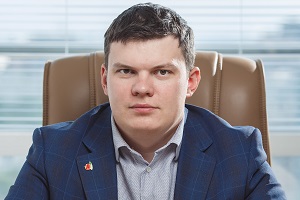Charging Electric Vehicles with Dmitry Lashin
What does the future of electric vehicle charging stations look like? Dmitry Lashin shares his innovative approach for making it fast and easy!
Listen to us On
About the Episode
LifeBlood: We talked about charging electric vehicles, how many locations are currently in existence, the challenges of regulation, the opportunity technology brings, and what the costs are to make it happen with Dmitry Lashin, Founder and CEO of L-Charge, a company advancing the accessibility and convenience of EV charging.
Listen to learn what the entrepreneurial culture is like in Russia!
You can learn more about Dmitry at L-Charge.org, Facebook, Twitter and LinkedIn.
Thanks, as always for listening! If you got some value and enjoyed the show, please leave us a review wherever you listen and subscribe as well.
You can learn more about us at LifeBlood.Live, Twitter, LinkedIn, Instagram, YouTube and Facebook or you’d like to be a guest on the show, contact us at contact@LifeBlood.Live.

George Grombacher
Lifeblood Host

Dmitry Lashin
Guest
Episode Transcript
george grombacher 0:00
Come on one life blood. This is George G. And the time is right welcome. Today’s guest is strong and powerful Dimitri Lashon. Dimitri, are you ready to do this?
Dmitry Lashin 0:20
Yeah, already really looking forward, what we can discuss
george grombacher 0:25
today. Me too. Dimitri is the founder and CEO of L charge, they’re a company advancing the accessibility and convenience of charging for electric vehicles. Dimitri, tell us a little bit about your personal life some more about your work and why you do what you do.
Dmitry Lashin 0:43
Yeah, I can tell a little bit about myself. So I’m born in 1983. So now I’m 38 years old. So I left my profession livestock from family based company, so my father and uncle great in, in Russia, when the Soviet Union was gone, the company who make the automation different kinds of systems for steering processes in the greenhouses to grow the vegetables. And so my, actually, my first experience in working in was in in the family based company. So in 2001, I came into the company, and started to be a software engineer. So during the company, I’m, how’s it growing there, and even a few years, I wasn’t even CEO of their family based company. But during we build our company, we have opportunity to find another direction. So we just start to build and build greenhouses for ourselves, not just make a systems for greenhouse, but start to build the greenhouses ourselves. And there was needed really a lot of knowledge to build it because most of the greenhouse in Russia and the United States by the way, as well they use it assimilation, lighting, so it’s a special lamps which are lighted on the on the blends, and you stimulate photosynthesis, so you can get much more harvest much more fruits. And so during like this, we, I need to know a lot about electricity and how to how to produce electricity, how to use it, because we’ve got a joke that all lights that we use in our greenhouses, we can cover equator around the world two times. So with this amount of light, that’s really a lot. And so I really collect big, big round in the energy. But last year, we make an m&a deal. So with another greenhouse complex in Russia. So in total it will became the company which for actually cost more than a billion dollars. So quite a big company. And I stay on minor, minority shareholder in the company. And so I’ve got some free time not not too much involved in operational business, I’ve got some free time to do something more. So that’s why I decided to use my knowledge about energy to combine it with with the most more than directions like electric vehicles. And how I get to this point that we really start to develop and start to produce old dry speed electric chargers for for electric vehicles. So we really strongly believe in the electric vehicle future because these cars is really much more safe, much more reliable, much more environmental friendly, less maintenance than traditional car and actually cheaper with with with fueling, because the electric fuel is cheaper than conventional.
But when we look at the market, that that’s interesting, we discover that the most common question when when you ask people why you still do not use the electric cars, everybody say, Yeah, we have no place to charge. But if you look deeply in that, that all over the world, there is a 2 million public charging station already. And only 1.5 Gasoline fueling station. So just imagine that’s already 500,000 more charging stations than the fueling stations. But anyway, the people do not. Anyway, ask the question about the charging. Why? Because the right question is not where to charge or where to charge fast. Because everybody would like to charge, like fueling like all in on on the gasoline. Nobody would like to spend 4050 I don’t know one hour on a charging point and then go. So just imagine that you, for example, running 100 kilometers per hour and then you need to wait another hour to try 100 kilometers. That’s not That’s not normal in the 21st century. So we mainly focus on the high speed charging, so we really would like to make it like that. And finally, we will also have a look at the market. And we understand that in the past, there was a problem by electric vehicles itself. So they cannot take such amount of power so that there was a technical problem to charge. But nowadays, it’s changed. So now modern car like Tesla, like Porsche, like Hyundai, Ionic, they really can take a lot of power. So they, that’s possible to charge them fast. But now that allows the question where to put search so many electricity to go in. And that actually where we are, let’s say, pain reliever or problem solver, we say that, yes, we can provide a charger which are not connected to the grid. So nevermind where we are in the United States, in India, or Bangladesh or all over the world, we can place the USB charger completely off grid. So that’s that general idea of our product? And yes, of course, it it gets the electricity cannot to appears from from anywhere. So of course we should somehow to generate it. And here I use my 15 year background in the energy production. And so we build a special view. One is hydrogen that’s friendly. The another one is LNG. Its renewable natural gas, which are actually now provided in a it’s more in provided in the United States and in Europe, because they really, guys are focused on environmental friendly. And so that’s why they really do they start to produce the special fuel, renewable natural gas. And in the USA, in a in a critical scenario where there is no other fuel is available. We can use LNG, it’s liquid natural gas. That’s, that’s yeah, not convercent co2 friendly, but that’s mostly in fuel from all fossil fuels, mostly us. So that’s that’s actually our general idea of Al George.
george grombacher 7:14
Nice. Well, I appreciate that. So those 2 million charging stations is in that number. If I have a Tesla and I have a charging station in my house, is that part of the 2 million or?
Dmitry Lashin 7:28
No, no, I talk only about the public charging stations. If it is in your house, it’s a private so nobody else can use it.
george grombacher 7:35
I hope so. Right? Okay, well, that.
Dmitry Lashin 7:38
So we talk only about the public that everybody can have access.
george grombacher 7:42
That is surprising that there that there are 500,000 more electric charging stations than there are gas stations. Okay, so what when, when when you decide and I guess it’s it’s not necessarily important for a conversation today if you use hydrogen, the renewable or the the LNG? How are you thinking about where to where to put these? Obviously, people decided to put gas stations where they put gas stations, but how are you thinking about where to put your stations?
Dmitry Lashin 8:18
That’s very good question Jory because we have got two options, by the way, three options, but in general two, one is the fixed we call it fixed stations and so it’s some kind of static look like container and we’re think we already some negotiations with oil and gas companies that we locate them on existing retail network of oil and gas companies for example. There is some gas stations normal and we locate there this station so that’s that’s solve a lot of problems. So first of all, their gas station have a new customer since electric vehicles. So if there is some shops supermarket or restaurant they they’re they’re also new customer for them. These oil and gas companies can utilize their products because normally all these oil and gas companies have a hydrogen have renewable gas and LNG so they can utilize their product that they produce. And then by the way, we’ve got quite brought profitability economics of of charge of producing electricity, so they even can have a new type of income. So that’s number one. And number two is we really, we are really first in the world who make a mobile charger, show it to the charger on a on a small truck. So we can go especially in the city, everywhere. So you can just call us as an app through the app or through anyplace anytime. We can go and charge your car and by the way, we even don’t need you near the car. So we just come open the hatch, plug our hosts in your car, charge you and go to another So that’s that’s, that’s workable. So I think this kind of solution is really, especially in the beginning when the market is growing is much more easy because, you know, if you place the fixed charger, of course, the question how much electrical ecosystem, and if we talk about the California, of course, it’s a really big place where the electric vehicles already presented. But if we look at another state’s, that’s not enough electric cars to utilize this. So that’s why we have got this solution just to go where we where we need it, it’s more for urban areas. And by the way, for people who live in the cities, for them, it’s also fear resolver. Because yeah, if you are at home, of course, it’s easy, you can use your home charger, but if you live in their apartment building, you have no socket, so you’ve got the fear how we can buy the electric vehicle. So that’s the solver and number theory, we now develop the charging boat. So now on the market appears a lot of electric boats were also have a lack, they also have a lack of charging. So because normally in harbors, you have no a lot of electricity or maybe just fuel just for lightning but not for charging. So we now announced that we are going to make autopilot charging board who are actually driving and charging boats everywhere. So for autopilot car, it’s quite complicated because you know, it’s a road, but for the for the for the sea and for the for the river. That’s that’s much more easy. So that’s why we we would like to provide some kind of real reliable and realistic solution, not just too far away in the future.
george grombacher 11:39
Well, very cool. And all that certainly makes sense. What, what what is the cost? If if your mobile station or your mobile charging station comes to my office building? How much does it cost to fill up my to recharge my electric car battery?
Dmitry Lashin 11:58
Yeah, that’s also good questions already, because because if we look about the fixed charger, so that’s around 40 cents per kilowatt hour. So it’s more or less comparable with with our competitors. So plus minus the same amount. But for mobile charger, it’s more, it’s more expensive. I would say that starts from 80 cents per kilowatt hour. But explain you why. Because in the course of this biggest part is the driving salary. So we need to pay for the driver who are running around the city. So that’s, that’s why we need to provide it much, much expensive, more expensive. But on the other hand, it is a series so we of course delivered to you.
george grombacher 12:45
Yeah, the others no doubt about that. Totally makes sense. Nice. Okay, so are you seeing any resistance? What are what are the big sort of blocks or challenges that you need to overcome to really make this huge commercial success?
Dmitry Lashin 13:08
Of course, there is a few, a few challenges that we are feeling. Of course, number one is a certification. Because especially for startup, it’s it’s a little bit complicated, you know, you have good brilliantly, you’ve got the product, stay in front of the wall of this certification procedures, government approvals. So that’s, that’s where startup might not thinking about it. So then this is the challenge that we need to house it to solve. And, yeah, I think it’s a while the rest, I do not see any any other big challenges. Because when I talk with some investors, when I talk with some oil and gas companies with or with automobile companies, everybody think that this is good, brilliant idea, because it’s it’s actually what we are now needing we need to immediately build the infrastructure. So we need to solve chicken and egg problems with a x. So let’s say for sure, provide at the beginning, the charging infrastructure and 10 already wait when the people start to buy electric vehicle. So that’s why that’s
george grombacher 14:24
yeah, that’s certainly that. That certainly makes sense. And I am. I want to say good luck. And thank you for thank you for going through the headaches of trying to deal with all of these different countries and all the different regulations. And within just I can’t even imagine trying to go into the United States and then having to deal with each state and probably each city and everything else, let alone just trying to get it done in Moscow or trying to get it done in India. I mean, those are those are fascinating problems. I am sure
Dmitry Lashin 15:01
That’s That’s true Georgia, but we are never give up. So we are, we know this, we we actually we have got a lot of not volunteers, but at least a lot of people who would like to help in that. And so that’s that that’s why I would say that our world is really quite friendly if you really have a good idea that the people really would like to help you to provide it in, in the mass market.
george grombacher 15:25
Yeah, yeah. I imagine. Just just like you mentioned, I imagine that there’s probably a lot of companies that that would want to partner with you, if it’s big gas companies that have existing filling stations that would be interested in having this resource available, and, and everything else. So I’m confident you’ll figure it out. In the United States, we have a love affair and have had a love affair with entrepreneurship for some years. What is how would you talk about the entrepreneurship climate in in Moscow?
Dmitry Lashin 16:05
Den I don’t, it’s only in the beginning. So the real there is a climate. And of course, I’m actually very proud of my country. I really like that I born in Russia, of course, we know that some challenges where this political works, you know that. So all the time somewhere, some enemies, but I’m away from politics. So that’s why. And we see that even in Moscow, now, the government also stimulate in their power enterpreneurship climate, of course, it’s not like Silicon Valley in a in the United States. And we have got a far big gap to reach that. But we are trying to, and actually, we ago, we were going forward, I also see a lot of young people who really strong believe in their forces, who can sit down in their garage in their I don’t know, in their and their houses programming, making nice software or nice new products. So I see this, I see it in the faces, I see it in the in the eyes. So that that’s, that’s, that’s number one. So I’m sure if there is, if there is such people, there all the other challenges, like regulation certainly can be solved. So that’s, that’s, that’s most important. And I see that it’s now growing.
george grombacher 17:25
Yeah. I appreciate that. I like it. Well, Dimitri, thank you so much for coming on. Where can people learn more about you? And how can they engage with our charge? Sorry, how? How can people learn more about you? And are there opportunities to get involved?
Dmitry Lashin 17:45
yarby to again, of course, we’ve got a website, we’ve got a lot of now articles that we are publishing the internet. So I’ve got my personal page in LinkedIn. So I’m very open to talk to discuss me, it’s also very important, you know, to to gather feedback, so it should not be just only positive feedback that everybody happy, but also I’m waiting for the reasonable maybe they’re negative feedback that maybe you do not look at this and that, like you asked me about the challenges, what kind of challenges you’ve got. And that’s that’s really important to know the challenges in the beginning maybe have that have blinders and do not see something on oil, what can happen. So that’s why we are as a team, so I’m not of course not alone in the in charge. We as a team, I really open to this to new areas to new feedback, even even from regular people. For me, it was a really pleasure. I’ve got a me personally, I’ve got some interviews from California, Evie users to learn their pains what they’ve got, what what kind of problems and I would say that in California, what the Elon Musk made it’s brilliant actually the Tesla Supercharger network built quite successful. So I do not get any negative feedback of usage Tesla maybe from another vehicles little bit some complicated but about a Tesla everybody happy? Maybe they’ve got a little bit transforming mind because they still ready to wait for 30 minutes to charge on the Tesla Supercharger. But they’re happy with that. So that’s, that’s important.
george grombacher 19:23
Yeah, no, I appreciate that. And wanting the feedback, both negative and positive. Both both both valuable. So I love it. Well give us the website, Dimitri.
Dmitry Lashin 19:35
Oh, yeah, we’ve got I just would like to you, I should just pronounce it. I’ll charge org. Perfect. So we have got to Yeah.
george grombacher 19:45
Excellent. Well, if you enjoyed this as much as I did, so Dimitri appreciation and share today’s show with a friend who also appreciates good ideas, go to L charge.org. And check out everything that we’ve been talking about find Dimitri on LinkedIn as well. connect with him there and let him know what your experience has been with electric vehicles specifically with charging and and we’ll see what the future holds. Thanks good to Maitri.
Dmitry Lashin 20:10
Yeah, thank you very much.
george grombacher 20:12
And until next time, keep fighting the good fight. We’re all in this together.
Transcribed by https://otter.ai
More Episodes
Financial Tips for Newlyweds: Building a Strong Financial Foundation Together
Congratulations on your recent marriage! As you embark on this new chapter, it’s essential to start building a strong financial foundation as a couple. Navigating finances together may seem daunting, but with clear communication and strategic planning, you can achieve...
How to Overcome Market Risk in Retirement Using Annuities
Retirement should be a time of peace and freedom—not stress and financial uncertainty. But for many retirees, one major concern threatens that vision: market risk. The fear of a stock market downturn wiping out years of hard-earned savings can keep even the most...
How to Set Up Your Retirement Budget and Create Guaranteed Income with a Fixed Annuity
One of the most important steps to enjoying a stress-free and financially secure retirement is having a well-planned retirement budget — and making sure that budget is supported by reliable, guaranteed income. While investment accounts can offer growth, they also...
How to Make Sure You Don’t Outlive Your Retirement Nest Egg — With the Help of Annuities
One of the biggest fears facing retirees today isn’t boredom, health issues, or even the rising cost of living. It’s the fear of outliving their money. And it's a valid concern. With people living longer, markets remaining unpredictable, and inflation eating away at...
How to Have an Anxiety-Free Retirement Using Budgeting and Annuities
Retirement should be a time to relax, explore your passions, and enjoy the life you've worked so hard to build. But for many retirees, financial anxiety can cast a long shadow over those golden years. One of the most effective ways to manage this anxiety is through...
How to Manage Financial Uncertainty and Anxiety in Retirement Using Annuities
Retirement is meant to be a time of relaxation, freedom, and enjoyment. But for many retirees, it can also bring anxiety and uncertainty—especially about finances. Concerns about outliving savings, market volatility, rising costs, and unpredictable healthcare expenses...
How to Handle Inflation on a Fixed Income in Retirement
Inflation is one of the biggest threats to a comfortable and sustainable retirement. As prices for everyday goods and services increase over time, the purchasing power of your money decreases. For retirees living on a fixed income, this can be especially challenging....
Finding Safety in Retirement with Annuities
Planning for retirement is one of the most significant financial journeys a person takes. While retirement is often envisioned as a time of relaxation and enjoyment, many people face the looming question: "Will my money last?" With market volatility, rising healthcare...
Using Annuities to Overcome the Fear of Spending Too Much in Retirement
One of the biggest concerns for retirees is striking the right balance between enjoying their savings and making sure they don’t run out of money. The fear of spending too much too soon can lead to financial anxiety, limiting a retiree’s ability to fully enjoy their...
Join the show.
Interested in being on the show? Tell me a little bit more about you and what you’d like to talk about!














